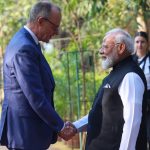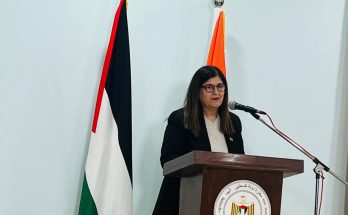
Ahead of the Quad summit in Australia in May, the foreign ministers of Quad countries held their meeting in New Delhi and called for “just and lasting peace in Ukraine”, and respect for a rules-based order in the South and East China Seas. These statements were aimed at Russia and China, which are seen to have deepened their alliance in the aftermath of the Ukraine war.
This was also the first such statement by the Quad grouping on the Ukraine crisis, indicating growing disappointment among the four countries against the Russia-Ukraine war which has disastrous knock-on effects on food, fuel and fertilizers crisis in developing countries. This is the first time a direct reference to the Ukraine war has been made in the FMs’ statement, and comes a day after Russia and China stalled consensus on a statement on the Ukraine crisis at the G-20 Foreign Ministers’ meeting.
Significantly, the four Quad countries also drew redlines vis-à-vis the Ukraine war by taking a strong collective stand against any future use of nuclear weapons. “We continued to discuss our responses to the conflict in Ukraine and the immense human suffering it is causing, and concurred that the use or threat of use of nuclear weapons is inadmissible,” said the joint statement.
“We underscored the need for a comprehensive, just and lasting peace in Ukraine in accordance with international law, including the UN Charter. We emphasised that the rules-based international order must respect sovereignty, territorial integrity, transparency and peaceful resolution of disputes.”
The joint statement was issued at the end of the Quad meeting between External Affairs Minister S. Jaishankar, Australian Foreign Minister Penny Wong, Japanese Foreign Minister Yoshimasa Hayashi and U.S. Secretary of State Antony Blinken,
South China Sea
The emphasis on the rules-based international order and territorial integrity was aimed at warning China about the perils of continuing belligerence on territorial issues, said experts.
“We express serious concern at the militarization of disputed features, the dangerous use of coast guard vessels and maritime militia, and efforts to disrupt other countries’ offshore resource exploitation activities,” said the joint statement in reference to China’s designs in South China Sea.
Sharp reaction by Russia and China
Predictably, Russia and China reacted sharply to the Quad foreign ministers’ remarks. Russian Foreign Minister Sergey Lavrov targeted the Quad for “playing one country against another” and slammed the Quad proposal for ASEAN cooperation, which he alleged was an attempt to cut Russia and China out of the East Asia summits.
“We never engage in playing any country against any other country but this is unfortunately being tried by some other outside players in the context of so-called Indo-Pacific strategy, using Quad not for economical purpose but trying to militarise it,” Mr. Lavrov said at the Raisina Dialogue.
In Beijing, Foreign Ministry spokesperson Mao Ning accused the Quad of practising exclusionary politics. He called on the Quad “to do more things that contribute to security and mutual trust between regional countries and that help to maintain regional peace and stability”, rather than being “about putting exclusionary blocs”
The Way Ahead
The foreign ministers meeting reaffirmed the Quad’s credentials as a force for regional and global good and a guardian of a free and open Indo-Pacific. The meeting also focused on the positive and constructive agenda practical cooperation in addressing contemporary challenges such as health security, climate change and the clean energy transition, critical and emerging technologies.
The foreign ministers’ meeting in New Delhi has forged an ambitious and multi-pronged agenda for the next Quad summit in Australia in May this year.
From India’s point of view, the Quad meeting was a boost to its long-standing quest to depoliticise terror and mobilise international pressure on the use of cross-border terror by Pakistan. The Quad joint statement condemned terrorism, including the 26/11 Mumbai attacks “which claimed lives of citizens from all Quad countries”, and the Pathankot attacks. In particular, the statement expressed “concern” about the politicisation of UN designations for sanctioned terrorists, another remark aimed at China for placing holds on terror designation proposals made jointly by India and the U.S. last year.
Speaking at a “Quad Panel” of the Raisina dialogue conference organised by the Ministry of External Affairs and the Observer Research Foundation, External Affairs Minister S. Jaishankar highlighted that the joint statement had supported India’s demand for UN reform, and the inter-governmental negotiations process for expansion of the UN Security Council.
Author Profile

- Manish Chand is Founder and Editor-in-Chief of India Writes Network (www.indiawrites.org) and India and World, a pioneering magazine focused on international affairs. He is CEO, Centre for Global India Insights, an India-based think tank focused on global affairs.
Latest entries
 India and the WorldFebruary 7, 2026Modi hails interim India-US trade deal, Goyal says no concessions made on agriculture
India and the WorldFebruary 7, 2026Modi hails interim India-US trade deal, Goyal says no concessions made on agriculture India and the WorldFebruary 2, 2026Trump announces trade deal with India, Modi ‘delighted’
India and the WorldFebruary 2, 2026Trump announces trade deal with India, Modi ‘delighted’ India and the WorldJanuary 31, 2026Palestinian minister bats for mediatory role for India in ending Gaza conflict
India and the WorldJanuary 31, 2026Palestinian minister bats for mediatory role for India in ending Gaza conflict India and the WorldJanuary 13, 2026India, Germany raise the bar for defence, economic ties
India and the WorldJanuary 13, 2026India, Germany raise the bar for defence, economic ties







